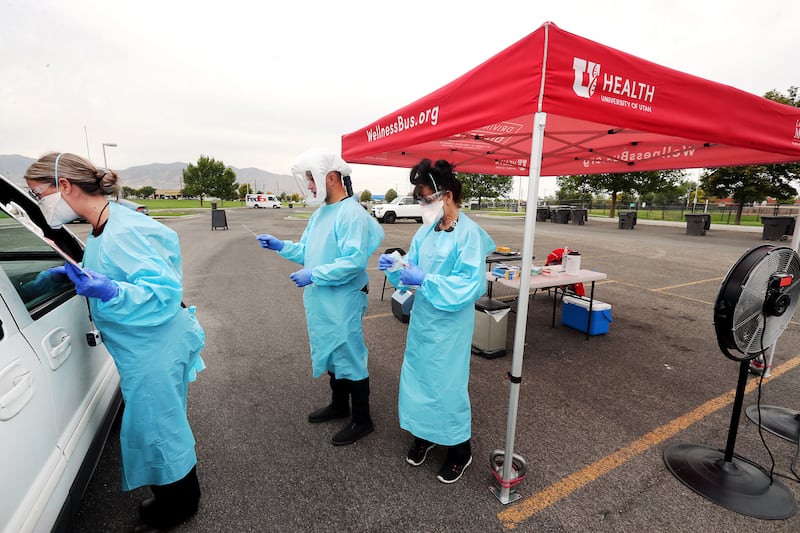SALT LAKE CITY — In less than a year, health experts have learned that masks prevent the spread of the coronavirus, how to quickly test for COVID-19 and are reportedly close to developing a vaccine.
And while it’s too soon to know the long-term effects of the coronavirus, scientists are starting to identify and study some of the lasting effects of COVID-19. Early research shows that the coronavirus is having serious consequences on the cardiovascular system.
“This is a disease, I think, that has a number of sort of mysteries involved compared to the usual respiratory virus,” said Dr. Gregory Poland, a physician and researcher with the Mayo Clinic Vaccine Research Group. In comments shared on the Mayo Clinic’s coronavirus website, Poland reported a variety of COVID-19 induced health problems.
“We’re really seeing a number of reports of people who report long-term fatigue, headaches, vertigo, interestingly enough difficulties with cognition with cardio-respiratory fitness,” he said. “And I think what we’re going to find out is that a large portion — not all — but a large portion of that is likely to relate to this significant cellular-level damage.”
“I think it’s an argument for why we take this disease so seriously,” he added.
Poland warned that people who may have had mild or no coronavirus symptoms might think they’re over it, but “the data suggests otherwise.”
The lasting complications are affecting the heart in ways that scientists are just beginning to understand. Poland said there is evidence of coronavirus patients experiencing myocardial damage, cardiomyopathy ( a heart disease which can cause the heart muscle to become weaker), arrhythmias, decreased ejection fractions (a metric for determining the heart’s pumping capacity) and arterial and venous occlusions (clots in the arteries or veins).
Doctors have also found pulmonary fibrosis, or the scarring of the lungs, in coronavirus patients, he added.
So why is a novel respiratory disease affecting the heart and circulatory system? University of Utah cardiologist Dr. Kevin Shah has the answer.
“There are other viruses in the same family of this virus, SARS-CoV-2, which have been known to cause cardiovascular problems,” said Shah.
What’s unique about this virus is its highly contagious nature, the cardiologist said, and that “there’s high affinity for the virus to bind to a particular protein which is expressed in within the heart and within endothelial cells, or blood vessels.”
Shah said another cause of the cardiological problems associated with the disease comes from the body’s own response to the virus.
“What we’re seeing in cases of severe infection, the body often produces a strong immune response to fight the viral infection and that strong immune response can potentially, indirectly, cause cardiovascular consequences,” he explained.
In an article released Tuesday by the U., health care professionals recognized these cardiovascular consequences in “severe COVID-19 cases” and it was “more common among patients who are older adults and have known risk factors of heart disease.” Obesity, particularly in young people, was an additional risk factor.
University of Utah Health, like the Mayo Clinic, has also seen examples of myocarditis, cardiomyopathy, arrhythmia and blood clots in coronavirus patients. Shah also identified other cardio-related illness such as strokes and heart attacks.
Shah said people who have COVID-19 should pay attention to their body during and after recovering from the virus. Cardiologists across the country, he said, have seen “delayed presentations” of serious to fatal heart conditions because individuals have been anxious to seek medical help during the pandemic. These conditions are “time sensitive” and a delay in care could lead to more serious consequences.
It’s important that people “not ignore any new symptoms that come up,” Shah said.
“Things like chest pain, lightheadedness, heart fluttering sensation, shortness of breath (and) unusual fatigue,” were symptoms the cardiologist identified. “These are things that should be checked out by a physician.”
Research from the World Heath Organization found most people diagnosed with COVID-19 have “mild symptoms or moderate illness,” and around “10-15% of cases progress to severe disease,” according to a WHO document from Sept. 9. Around 5% of cases become “critically ill.”
In a U.S. Centers for Disease Control and Prevention multi-state telephone survey — cited by WHO — of adults who had symptoms of the virus and had tested positive for the coronavirus, “35% had not returned to their usual state of health when interviewed 2–3 weeks after testing.” And 20% of 18- to 34-year-old adults had also not returned to their pre-COVID-19 health.
“COVID-19 can result in prolonged illness, even among young adults without underlying chronic medical conditions,” reports the CDC survey.
Along with heart and lung damage, the WHO identified brain and nervous system consequences — like losing the sense of smell and memory and concentration impairment — as potential long-term health problems affected by the coronavirus. Fatigue, joint and muscle pain and mental health illness were others.
“This can be a really wicked virus in some people,” said Poland of the Mayo Clinic. “We’re going to see more and more of the longer term consequences come out and we’re going to need to study those as vigorously as we did the acute symptoms, catalog them, understand them and then clinical trials to figure out how best to treat them.”


